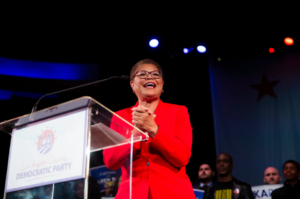Karen Bass Becomes First Woman Elected as Los Angeles Mayor
Karen Bass, a veteran Democratic congresswoman, on Wednesday became the first woman elected as mayor of Los Angeles after pledging to build coalitions in a metropolis torn by racial tensions and fed up with homelessness. The race was called by The Associated Press.
Ms. Bass survived a bruising contest against Rick Caruso, a billionaire real estate developer, that had remained too close to call for more than a week after the election. Mr. Caruso had pumped roughly $100 million into his campaign as a law-and-order candidate, hoping to appeal to a frustrated electorate.
On Wednesday, Los Angeles County election results showed her with more than 53 percent of the vote, with returns trending heavily for her.
“The people of Los Angeles have sent a clear message,” Ms. Bass said in a statement on Wednesday. “It is time for change and it is time for urgency.”
Ms. Bass’s election comes at a tumultuous moment in Los Angeles, a city of 4 million people that emerged from the pandemic to a landscape of tent camps, debris, economic anxiety and spiking violence. Although matters have gradually begun to improve and crime rates remain far below the city’s peaks of the 1990s, Los Angeles residents have expressed fury and exhaustion, particularly at the city’s epidemic of homelessness, according to surveys, focus groups and pre-election interviews.
In an interview last year at her hillside home — a ranch house in the Baldwin Vista neighborhood that was burglarized in September by thieves who stole two handguns — Ms. Bass, 69, said that the main reason she ran for mayor was the familiarity of the current civic unease. She said the city’s mood reminded her of the fear-stoked distrust and divisiveness that preceded the 1992 riots.
“That’s what is frightening to me now — the anger,” she said. “And my concern is the direction the anger can move the city in.”
Ms. Bass has said that as mayor she will declare a state of emergency on homelessness and find housing for 17,000 homeless people in her first year. She also has promised to put more police officers on the street, in part by freeing up sworn members to patrol the city rather than handle administrative tasks.
She will bring to the job a long history of coalition-building, dating to the 1980s, when as a physician assistant and emergency room worker she applied for a federal grant to launch a nonprofit to address the crack epidemic that was ravaging the city. The Community Coalition for Substance Abuse Prevention and Treatment — now known simply as the Community Coalition, or CoCo — has since become one of the city’s largest and most influential advocacy groups, working across the city’s vast array of ethnicities.
